Berjaya: from zero to hero
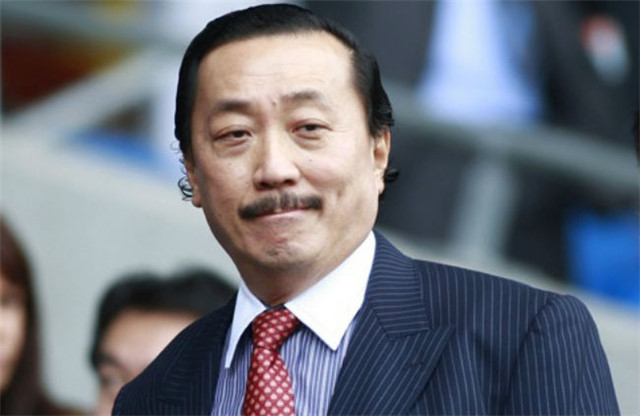 |
Humble beginnings
Chinese-Malaysian businessman Vincent Tan was born in 1952 in Malaysia. According to Malaysian media, Tan's great-grandfather was a core member of the anti-Qing dynasty movement that went into exile in Malaysia in 1882.
Despite being born and raised in Malaysi, Tan did not forget his Chinese roots. In Kampung Sungai Suloh, Tan invested in a school for students of Chinese origin.
His family could not afford to send him to university, so at age 17 Tan had to work to support himself. At first, he worked as a bank clerk, then as a broker for an international insurance company.
At age 29, at a time when few people knew about fast food, he bought the license to open a McDonald's restaurant and introduce Malaysia to the quickly spreading Western phenomenon.
In 1984, he bought a stake in Berjaya Industrial Berhad Company (also known as Berjaya Kawat Berhad) from its two founders, Australian Broken Hill Proprietary Company and Singaporean National Iron & Steel Mills Company, and established Berjaya Corporation Berhad.
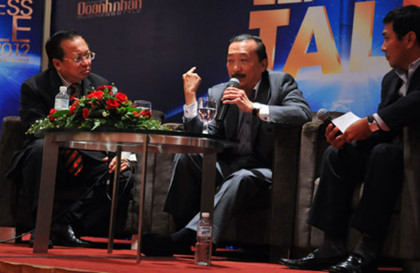 |
| Vincent Tan started his career from zero |
Next, he completed several M&A deals, such as buying 70 per cent of lottery company Sport Toto in 1985. In 1990, after restructuring the company, Tan had 100 per cent stake in Sport Toto. Some said the deal was successful because of his close relationship with the government, more specifically with former Malaysian Prime Minister Mahathir Mohamad.
Sport Toto eventually became Berjaya Land Berhad, one of the largest subsidiaries of the corporation. Berjaya Land Berhad operates in real estate, casinos, and entertainment. It also holds the most projects that are being built in Vietnam.
During the same period, Berjaya acquired more new real estates and expanded its entertainment services. The company bought and built hotels in Singapore, London, and Sri Lanka, launched a lottery business in the Philippines, started an online retailing arm via the e-commerce platform Cosway in Thailand, Hong Kong, Indonesia, Taiwan, and India.
During the 1997 economic crisis, banks' interest rate skyrocketed to 25 per cent, forcing numerous businesses into bankruptcy, including Berjaya. Vincent Tan sold a media company and his 70 per cent stake in Prudential to pay off debts.
At the height of his career, he continued to diversify by tapping into new markets. Across the world, Berjaya has about 100 subsidiaries and branches, with over 30,000 employees. Currently, the company has nine daughter companies listed on the Malaysian stock exchange Bursa Securities.
Tan was considered "the lottery king." According to Forbes Magazine, the Chinese-Malaysian businessman’s assets are worth $900 million.
 |
| Vincent Tan is the owner of the English football club Cardiff City |
In addition, Vincent Tan also invested in football, buying English football club Cardiff City in 2010. His financial contribution has revived the team, helping it climb back into the Premiere League in 2013. In December 2013, Vincent Tan continued to expand his football empire. He spent over €1.5 million ($1.6 million) to become the owner of Bosnian football team FK Sarajevo.
After becaming the owner, he changed the colour of Cardiff's jersey from blue to red. Even the team's blue logo was switched to red, despite opposition from fans. The reason was simple: Chinese people favour red colour and so did Tan. To him, red brings luck and prosperity and might help promote the Cardiff brand in China and Asia.
Ambitions in Vietnam
In February 2007, Vincent Tan's Berjaya became the first Malaysian corporation to receive a license to invest and develop real estate in Vietnam. The company's projects spread from the north to the south and carried enormous funding. So far, the company has invested in nine large-scale projects in Vietnam, with a registered capital of $9.98 billion.
The corporation now has controlling stakes in three big hotels: Intercontinental hotel in Hanoi (75 per cent ownership), Sheraton hotel in Hanoi (70 per cent), and Long Beach Resort in Phu Quoc Island (70 per cent).
Berjaya Corporation has a range of other big projects in Vietnam, such as Thach Ban New Urban Zone in Hanoi (also known as Hanoi Garden City, $320 million), Vietnam Financial Center in Ho Chi Minh City ($930 million), five-star hotel/residential/shopping centre complex Bien Hoa City Square ($100 million), and Nhon Trach New City Center ($2 billion). Most recently, the company announced plans to look into resort projects in central Da Nang province.
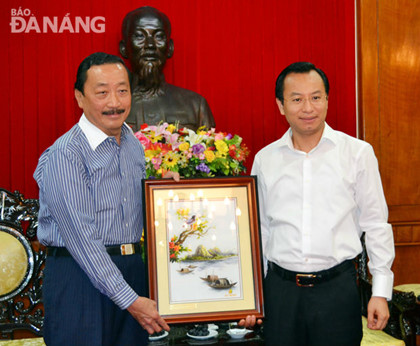 |
| Vincent Tan, chairman of Berjaya Corporation, met Nguyen Xuan Anh, the City Party Committee Secretary of Danang city on March 10, 2016 |
There is also Saigon Bank Berjaya Securities company (SBBS), a joint venture between Saigon Bank and Ky Hoa Ltd., with a registered capital of VND300 billion ($13.2 million). Berjaya also holds a 49 per cent stake in fund management comnpany Thep Viet Capital, an equivalent of VND24 billion ($1.1 million).
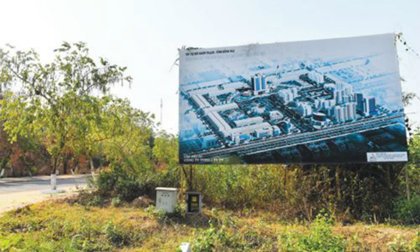 |
| The VUIT urban zone: advertised versus reality |
Berjaya also entered a joint venture with several Vietnamese companies, such as Berjaya-D2D Ltd., a JV between Berjaya Leisure (Cayman) Limited (75 per cent ownership), a subsidiary of Berjaya Land Berhad, and Industrial and Urban Development JSC No. 2 (D2D). Another joint venture is Berjaya-Handico12 Ltd, between Berjaya Leisure (Cayman) Limited (80 per cent ownership), a subsidiary of Berjaya Land Berhad, and Hanoi Housing Development and Investment JSC No. 12 (Handico12), where the subsidiary holds20 per cent.
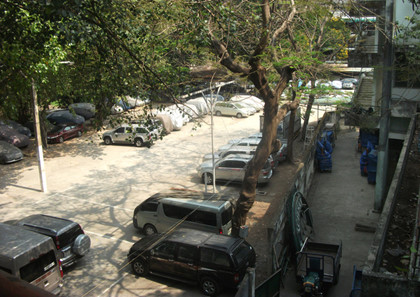 |
| Much of the land allotted to the Vietnam Financial Center project has been used as a parking lot |
Although entering Vietnam with confidence, Berjaya faces a few challenges, such as a sluggish real estate market, which caused delays in its multibillion-dollar projects Vietnam Financial Center and Vietnam International University Township (VIUT) in Ho Chi Minh City.
Despite owning mega projects, Berjaya does not have good business results. Apartments and villas in Hanoi Garden City did not sell well due to the project’s less-than-ideal location, whereas the $3.5-billion VIUT in Ho Chi Minh City risks having its investment certificate revoked due to delays.
Vietnam Financial Center is still on paper only and has not been started: it is mainly used as a parking lot for nearby restaurants. Meanwhile, Nhon Trach Urban Area had its license revoked by the southern province of Dong Nai one year after the project's announcement because the investor did not start building or applying for an extension of the license.
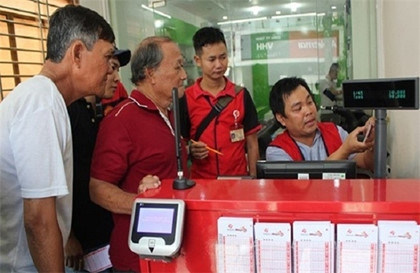 |
| Vietlott and Berjaya are not shy about ambition to become a big name in the lottery market |
Berjaya won the bid over five other international companies to become the first foreign investor to tap into Vietnam’s lottery market. Accordingly, Berjaya and Vietnam Lottery One-member Limited Liability Company (Vietlott), the only company in Vietnam allowed to sell computerised lottery, were awarded a $210.58-million contract to exclusively invest in and operate a computerised lottery project in Vietnam for 18 years. The deal was estimated to be worth $210.6 million.
The Vietnamese lottery market is worth about $3 billion. Although a newcomer, Vietlott aims to conquer 30 per cent of the market within a few years, which will bring in billions of dollars in revenue.
What the stars mean:
★ Poor ★ ★ Promising ★★★ Good ★★★★ Very good ★★★★★ Exceptional
Latest News
More News
- Pegasus Tech Ventures steps up Vietnam focus (February 05, 2026 | 17:25)
- The generics industry: unlocking new growth drivers (February 04, 2026 | 17:39)
- Vietnam ready to increase purchases of US goods (February 04, 2026 | 15:55)
- Steel industry faces challenges in 2026 (February 03, 2026 | 17:20)
- State corporations poised to drive 2026 growth (February 03, 2026 | 13:58)
- Why high-tech talent will define Vietnam’s growth (February 02, 2026 | 10:47)
- FMCG resilience amid varying storms (February 02, 2026 | 10:00)
- Customs reforms strengthen business confidence, support trade growth (February 01, 2026 | 08:20)
- Vietnam and US to launch sixth trade negotiation round (January 30, 2026 | 15:19)
- Digital publishing emerges as key growth driver in Vietnam (January 30, 2026 | 10:59)















 Mobile Version
Mobile Version